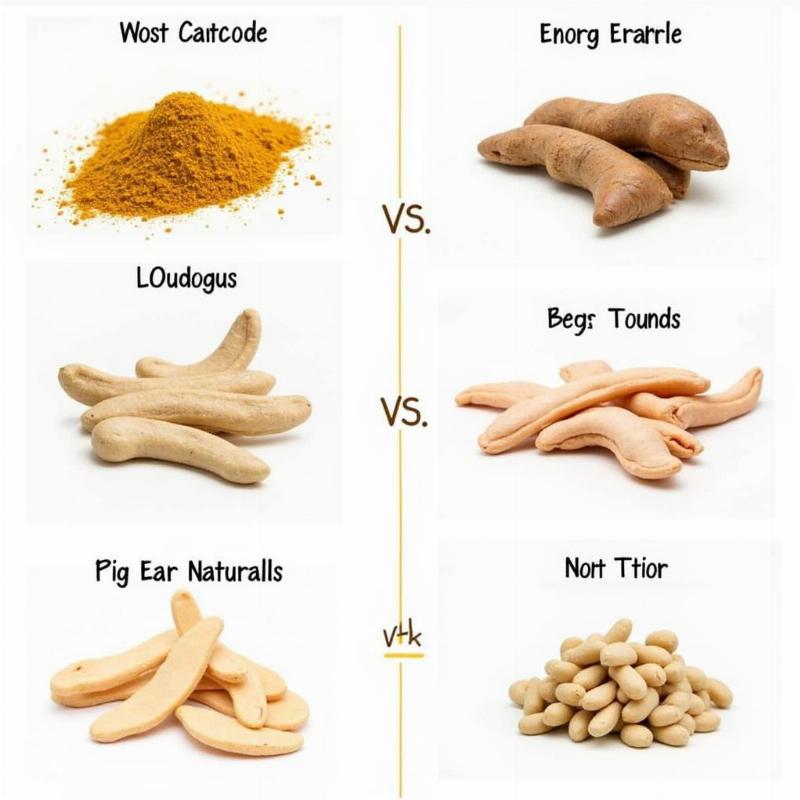Pig ears are a popular chew treat for dogs, and for good reason. They offer a variety of benefits beyond just keeping your furry friend occupied. From dental health to providing essential nutrients, let’s explore why pig ears have become a staple in many dog households across America. But are they right for your dog? Let’s dig in and find out.
Chewing Satisfaction and Stress Relief with Pig Ears
Dogs have a natural instinct to chew, and pig ears offer a safe and satisfying outlet for this behavior. The tough, chewy texture helps satisfy their urge to gnaw, reducing destructive chewing on furniture or other household items. Chewing also releases endorphins, which have a calming effect and can help alleviate anxiety and stress in dogs. This is particularly beneficial for puppies who are teething or dogs who experience separation anxiety. Imagine coming home to a relaxed pup instead of a chewed-up sofa cushion!
Nutritional Benefits of Pig Ears for Dogs
Besides satisfying a dog’s chewing instincts, pig ears offer some nutritional benefits. They are a good source of protein and chondroitin, which supports joint health. However, it’s important to remember that pig ears should be given as a treat, not a meal replacement. They can be high in fat and calories, so moderation is key. Always consult with your veterinarian to determine the appropriate amount of pig ears to give your dog based on their breed, size, age, and activity level.
Dental Health Benefits: Pig Ears and Your Dog’s Teeth
One of the most touted benefits of pig ears is their ability to promote dental health. The act of chewing on the tough ear scrapes away plaque and tartar buildup, helping to keep your dog’s teeth clean. This can contribute to fresher breath and reduce the risk of dental disease. However, pig ears are not a substitute for regular brushing and professional dental cleanings. Think of them as a helpful supplement to your dog’s overall dental care routine.
Choosing and Safely Giving Pig Ears to Your Dog
Not all pig ears are created equal. When choosing pig ears for your dog, look for natural, minimally processed options. Avoid pig ears that are smoked or flavored with artificial ingredients, as these can be harmful. Always supervise your dog while they are chewing on a pig ear to prevent choking hazards, especially with smaller dogs or aggressive chewers.
 Choosing safe pig ears
Choosing safe pig ears
Are Pig Ears Safe for All Dogs?
While generally safe, pig ears are not suitable for all dogs. Dogs with pancreatitis or other digestive issues should avoid pig ears due to their high fat content. Puppies and senior dogs with weaker jaws may also have difficulty chewing them. Always consult with your veterinarian before introducing pig ears or any new treat to your dog’s diet.
Conclusion: Pig Ears – A Tasty and Beneficial Treat for Your Canine Companion
Pig ears can be a valuable addition to your dog’s treat repertoire. They offer chewing satisfaction, support dental health, and provide some nutritional benefits. However, moderation and careful selection are crucial. By choosing high-quality pig ears and following safety guidelines, you can ensure that your furry friend enjoys this tasty treat while reaping its potential benefits. Remember to always consult your veterinarian with any questions or concerns about your dog’s diet and health.
FAQ: Your Pig Ear Questions Answered
- Can puppies eat pig ears? While puppies can benefit from the chewing action, choose smaller pig ears designed for puppies and supervise them closely.
- How often can I give my dog a pig ear? Pig ears should be given in moderation due to their high fat content. Consult your vet for guidance on frequency.
- Are smoked pig ears safe for dogs? Smoked pig ears often contain added chemicals and preservatives that can be harmful. Opt for natural, minimally processed options.
- What if my dog swallows a large piece of pig ear? Contact your veterinarian immediately if you are concerned about your dog choking or experiencing digestive issues.
- Can pig ears upset my dog’s stomach? Some dogs may experience digestive upset from the high fat content. Introduce pig ears gradually and monitor your dog’s reaction.
- Are there any alternatives to pig ears for chewing? Yes, there are many other safe and healthy chew treats available, such as bully sticks, rawhide alternatives, and dental chews. Discuss options with your veterinarian.
- Where can I buy high-quality pig ears for my dog? Look for natural, minimally processed pig ears at reputable pet stores or online retailers.
Related Articles on Beautdogs.us
- Pigs ear treats for dogs
- Are dried pigs ears safe for dogs
- Dental chews for dogs with pancreatitis
- Dental chews for senior dogs
Beautdogs.us is your premier resource for all things dog-related in the USA. We offer expert advice on dog breeds, care, training, and product recommendations. Whether you’re a seasoned dog owner or just starting your journey with a new furry friend, Beautdogs.us provides trusted, comprehensive, and engaging information to help you navigate the world of canine companionship. Contact us today for all your dog-related needs! Email: [email protected], Phone: +1 501-555-7529. Visit us at Beautdogs.us.